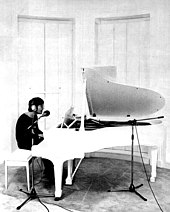1970–1980: Solo career
1970–1972: Initial solo success and activism
When it gets down to having to use violence, then you are playing the system’s game. The establishment will irritate you – pull your beard, flick your face – to make you fight. Because once they’ve got you violent, then they know how to handle you. The only thing they don’t know how to handle is non-violence and humor.
—John Lennon
In 1970, Lennon and Ono went through primal therapy with Arthur Janov in Los Angeles, California. Designed to release emotional pain from early childhood, the therapy entailed two half-days a week with Janov for four months; he had wanted to treat the couple for longer, but they felt no need to continue and returned to London. Lennon's debut solo album, John Lennon/Plastic Ono Band (1970), was received with praise by many music critics, but its highly personal lyrics and stark sound limited its commercial performance. Critic Greil Marcus remarked, "John's singing in the last verse of 'God' may be the finest in all of rock." The album featured the song "Mother", in which Lennon confronted his feelings of childhood rejection, and the Dylanesque "Working Class Hero", a bitter attack against the bourgeois social system which, due to the lyric "you're still fucking peasants", fell foul of broadcasters. In January 1971, Tariq Ali expressed his revolutionary political views when he interviewed Lennon, who immediately responded by writing "Power to the People". In his lyrics to the song, Lennon reversed the non-confrontational approach he had espoused in "Revolution", although he later disowned "Power to the People", saying that it was borne out of guilt and a desire for approval from radicals such as Ali.

Niciun comentariu:
Trimiteți un comentariu